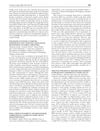
Melampus might have cured Proetus' daughters, who possibly had ergotism or Cushing's syndrome, using the herb Helleborus niger, but a mix of factors could have caused their symptoms.
11 citations,
October 2020 in “General and comparative endocrinology” Male C57BL/6 mice show age-related fluctuations in certain hormones and their ratios in both blood and hair.
 November 2023 in “JCEM Case Reports”
November 2023 in “JCEM Case Reports” A postmenopausal woman's excess male hormone symptoms improved after her ovaries were removed.
50 citations,
February 2021 in “Physiology & behavior” People with depression often have higher hair cortisol levels, while those with PTSD tend to have lower levels, but more research is needed to understand this fully.
 August 2021 in “Journal of Investigative Dermatology”
August 2021 in “Journal of Investigative Dermatology” Stress causes hair loss by making the body produce cortisol, which stops hair cells from growing.
 November 2022 in “Innovation in aging”
November 2022 in “Innovation in aging” Older adults in Puerto Rico often couldn't be tested for hair cortisol due to refusal or lack of hair, with race and hair products affecting results.
 August 2015 in “Arquivo Brasileiro de Medicina Veterinária e Zootecnia/Arquivo brasileiro de medicina veterinária e zootecnia”
August 2015 in “Arquivo Brasileiro de Medicina Veterinária e Zootecnia/Arquivo brasileiro de medicina veterinária e zootecnia” Caffeine intake during pregnancy and lactation can cause skin lesions in mother rats and their babies, not linked to cortisol levels.
March 2024 in “American journal of veterinary research” Clippers are the best tool for collecting dog hair for chemical tests, being fast and stress-free for the dog.
September 2021 in “Yearbook of pediatric endocrinology” Stress hormone stops a growth signal and keeps hair stem cells inactive, reducing hair growth.
9 citations,
April 1970 in “Biochemical pharmacology” Stilbamidine and hydroxystilbamidine inhibit enzyme release from lysosomes and have effects similar to cortisol and chloroquine.





